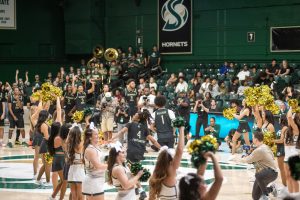Appellate Council makes ballot
November 10, 2004
The Appellate Council could lose most of its power over Associated Students legislative actions when students hit the polls on Dec. 8 and 9.
The council’s review power would be limited to the resolution of election complaints.
The council, appointed by Vice President of Student Affairs Shirley Uplinger, is an oversight committee with the authority and jurisdiction to overturn any decision made by the ASI Board of Directors and Election Complaint Committee.
The new legislation states that the council will be composed of members approved by the ASI Board of Directors, instead of Uplinger. Such members will include three students recommended by ASI President Joshua Wood.
“This is a significant change to the current bylaws,” said Patricia Worley, executive director of ASI. “The proposed language states that one of the students appointed will preside as the chair of the council, which would put faculty and administration appointed in more of a guiding position.”
Worley said under the current bylaw, members appointed to the Appellate Council have enough freedom and control to devise their own rules toward making a decision.
“This was where the frustration over the last election came in to play,” Worley said.
The results of last spring’s ASI election were contested in a series of hearings before the council over the summer and early this semester.
Though Worley acknowledged this may have impacted the last election, and the controversy surrounding it, Executive Vice President Angel Barajas said otherwise.
“We realized that the Appellate Council had very vague rules,” Barajas said. “We wanted to make sure that everyone was aware of the rules surrounding the council, and we wanted to devise rules that would help make the board more efficient.”
Barajas said it was not right for the elected members of the ASI Board to have an appointed committee with the power and jurisdiction to overturn any decision the board makes.
“We do not want to get rid of the Appellate Council, and we do not want to take away its power over Election Committee decisions,” Barajas said. “But we do believe that any decision made by the board should not carry the potential power of being overturned by a higher authority.”
“We trust ourselves to govern ourselves,” Wood said. “The last election had little effect on the creation of this piece of legislation. They are completely separate issues that dealt with the same entity.”
President Wood supported Barajas’ claim by stating that although the controversy surrounding the recent election was the initial reason for examining the rules surrounding the Appellate Council, in the end it was not the reason for pushing the new legislation.
The new rules also state the inclusion of the vice president of student affairs and a faculty member recommended by the Faculty Senate, along with the three students, to preside on the council’s board.






















































































































